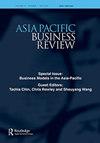中国家族企业的家族治理与战略取向:制度逻辑视角
IF 1.9
4区 管理学
Q3 BUSINESS
引用次数: 0
摘要
摘要家族企业的战略选择问题引起了人们的广泛关注。运用制度逻辑理论,认为家族企业的战略选择是二元体制与制度环境相互作用的结果。对中国上市家族企业的实证研究表明,随着家族控制权的增加,这些企业倾向于采取保守策略。然而,这种关系受到制度环境的影响。具体而言,随着市场化进程的推进,这种正向关联会增强,但随着宗教文化的强化,这种正向关联会减弱。这些发现揭示了作为中国文化组成部分的家族企业的行为特征和战略决策是如何受到地域文化制度的塑造和影响的。我们认为,在市场化转型的过程中,家族企业内部文化的建立是调和内部逻辑矛盾的关键。此外,应十分重视适应和利用外部体制环境。关键词:制度逻辑理论中国家族企业战略取向市场化传统文化披露声明作者未发现潜在利益冲突附加信息:基金资助:国家自然科学基金[No. 1];71972119;广东省高校重大科研项目[72272090];2022WCXTD006]和STU科研启动基金[No. 2022WCXTD006];STF22027]。作者简介梁强,汕头大学商学院教授。他在中山大学获得博士学位。他的研究重点是家族企业与创新。曾在《中国管理研究》、《亚太管理学报》、《商业伦理学报》、《管理世界》等中英文期刊上发表多篇论文。他的研究重点是家族企业与创新。徐元睿,汕头大学商学院研究生。她的研究重点是家族企业和创新。王博,汕头大学商学院助理教授。他在中山大学获得博士学位。他的研究重点是家族企业、企业家精神和制度。在《管理世界》、《南开商业评论》等中英文期刊上发表多篇论文。本文章由计算机程序翻译,如有差异,请以英文原文为准。
Family governance and strategic orientation of family firms in China: an institutional logics perspective
ABSTRACTFamily firms have attracted significant attention, prompting a surge of inquiry into their strategic choices. Drawing on institutional logics theory, we view the strategic choices of family firms as the interactive outcome of the dualistic system and the institutional environment. Empirical research conducted on listed family firms in China reveals that as family control increases, these firms tend to adopt conservative strategies. However, this relationship is influenced by the institutional environment. Specifically, the positive association is strengthened as marketization progresses but weakened as religious culture intensifies. These findings shed light on how the behavioural characteristics and strategic decisions of family firms, as an integral part of Chinese culture, are shaped and influenced by regional cultural institutions. We contend that during the process of marketization transformation, it is crucial to establish an internal culture within family firms that can reconcile the contradictions of internal logics. Additionally, significant importance should be placed on adapting to and leveraging the external institutional environment.KEYWORDS: Institutional logics theoryChinese family firmsstrategic orientationmarketizationtraditional culture Disclosure statementNo potential conflict of interest was reported by the author(s).Additional informationFundingThis work was supported by the National Natural Science Foundation of China [No. 71972119; No.72272090], Provincial major research projects in Guangdong universities [No.2022WCXTD006] and the STU Scientific Research Initiation Grant [No. STF22027].Notes on contributorsQiang LiangQiang Liang is a Professor at the School of Business, Shantou University. He obtained his PhD from Sun Yat-sen University. His research focuses on family firm and innovation. He has published many papers in English and Chinese journals such as Chinese Management Studies, Asia Pacific Journal of Management, Journal of Business Ethics, Management World, etc.Xi HuangXi Huang is a graduate student at the School of Business, Shantou University. His research focuses on family firm and innovation.Yuanrui XuYuanrui Xu is a graduate student at the School of Business, Shantou University. Her research focuses on family firm and innovation.Bo WangBo Wang is an Assistant Professor at the School of Business, Shantou University. He obtained his PhD from Sun Yat-sen University. His research focuses on family firm, entrepreneurship and institution. He has published many papers in English and Chinese journals such as Management World, Nankai Business Review, etc.
求助全文
通过发布文献求助,成功后即可免费获取论文全文。
去求助
来源期刊

Asia Pacific Business Review
Multiple-
CiteScore
4.40
自引率
13.80%
发文量
70
期刊介绍:
The growth of the Asia Pacific region and the rising presence of its multinationals in world markets has raised a number of questions about the origins of national economic success. Asia Pacific Business Review addresses these key issues and draws together the lessons of the analysis of culture, economies, history, politics and societies in the area, in order to explore business-related phenomena in the Asia Pacific countries, both in their general and specific contexts. The Review is intended for both academics and interested observers, contains the contributions of recognized experts, and is essential to anyone seeking the latest research on Asia Pacific business in a readily available, approachable form. We welcome articles which deal with nations and societies in the Asia Pacific region, namely those in East Asia and South-East Asia (but not South Asia), including those in APEC and ASEAN, individually or comparatively. Of interest also are contributions on the Asia Pacific economies, comparing those inside with those outside, or those investing in it. We do not, however, publish papers based solely on countries from outside the region.
 求助内容:
求助内容: 应助结果提醒方式:
应助结果提醒方式:


